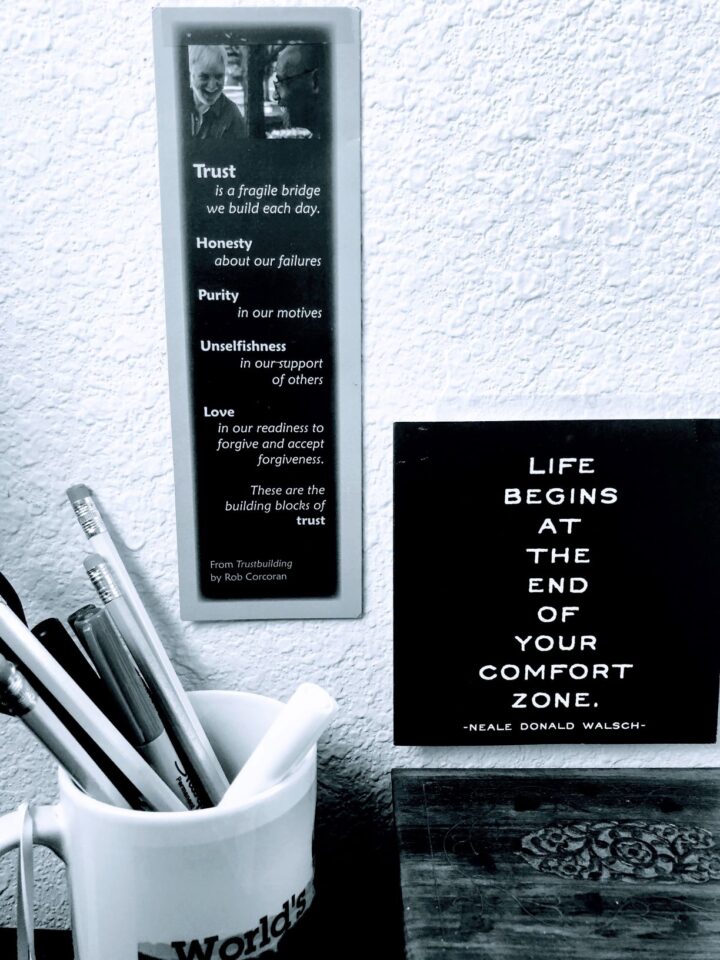My father-in-law, Alan Thornhill was an Anglican priest and playwright. My wife has been editing a book of reflections drawn from some of his sermons at the small country church in England which he served in retirement. In one of them he highlights three vital ingredients for a growing faith: air, food and exercise. We breath in and out as we tell God what is on our hearts and listen for his instructions for the day. We get nourishment from reading about those who have trod this way before and observing how the spirit is at work in the world. Then we need a daily “work-out” – in our lives and the lives of our communities. “If you want to keep an experience fresh you have to give it away…. We need to decide whether we will be thermometers accurately reflecting the temperature around us, or are we are going to be radiators that add warmth and change the status quo.”
I find myself thinking about this question as I watch the television talk shows or read the opinion columns in the newspapers. We are deluged with analysis, commentaries, polls and predictions. It becomes overwhelming and for many people depressing. What I find much more interesting is reading about people who are making a difference, often in small ways, but with great commitment and persistence. Across this country there are countless people who are taking steps of courage, breaking out of self-preoccupation and reaching out to bridge divides. They are radiators of hope and inspiration.
The journalist and author David Brooks writes that culture changes when a small group of people find a better way to live and the rest of us copy them. He calls such people “weavers,” people whose lives are oriented around social solidarity, not self.* Jim Wallis, founder of Sojourners, writes that when people see the kingdom of God actually lived out, they are “first surprised and then attracted.” He talks about “unexpected hope” and “breaking open the unpredictable.” ** So, how do we live in a way that breaks open the unpredictable and gives unexpected hope? A demonstration of authentic living is more effective than lecturing or condemning the people we see as “problems” and obstacles to change.
For those like myself on the liberal end of the spectrum, we need to pay enough attention to Thornhill’s first two ingredients: air and food. We are quick to form opinions and we’re often eager to get to action. But too often we are hesitant to affirm time-tested moral values and attention to God’s leading or our “inner voice” as an essential foundation for effective and sustained social change. It was heartening to participate recently in a webinar of evangelical Democrats hosted by Wallis who has battled for years to encourage liberals not to shy away from making faith as well as personal and social responsibility a more overt part of their message.
It’s not a surprise to me that the most violent confrontations sparked by police shootings of people of color in recent months have been in cities such as Seattle, Portland and Minneapolis, not in the Deep South. My own experiences with dialogue on racial issues indicates that despite the traumatic history of the South, blacks and whites interact more often and more intimately and can come together around shared concepts of spiritual centeredness. Further north, there might be greater sophistication and comfort level with intellectual concepts of racism, but people are often intractably segregated emotionally, psychologically and physically. Without attention to honest conversation, careful listening, and an intentional focus on building inner resources, activists working for racial equity risk becoming fragmented and unable to develop constructive strategies to counter extremism.
A card on my wall reads, “Life begins at the end of your comfort zone.” To be radiators of hope and to inspire others, we must develop personal practices that will nourish and sustain us as we reach beyond our comfort zones to build trust across traditional divides, even at the risk of misunderstanding or rejection by our own group. I will write more about this topic in future blogs.
*David Brooks, The Second Mountain: the quest for a moral life, Random House, 2019 .**Jim Wallis, On God’s Side: What religion forgets and politics hasn’t learned about serving the common good, Brazos Press, 2013.
